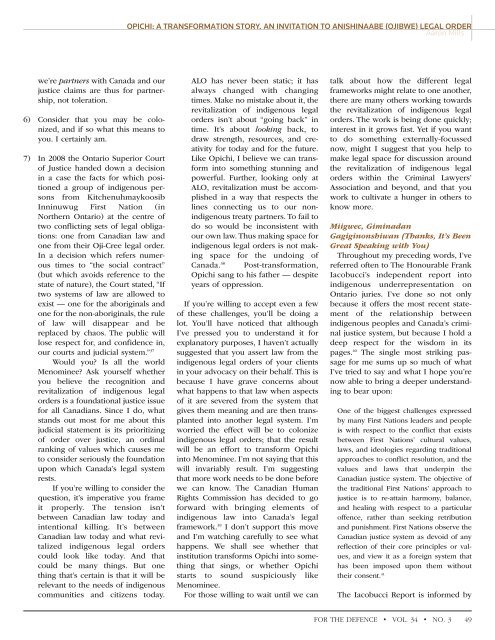FTD_Vol34_No3_web
FTD_Vol34_No3_web
FTD_Vol34_No3_web
Create successful ePaper yourself
Turn your PDF publications into a flip-book with our unique Google optimized e-Paper software.
For the Defence_34-3_Layout 1 13-08-16 10:41 AM Page 49<br />
OPICHI: A TRANSFORMATION STORY, AN INVITATION TO ANISHINAABE (OJIBWE) LEGAL ORDER<br />
we’re partners with Canada and our<br />
justice claims are thus for partnership,<br />
not toleration.<br />
6) Consider that you may be colonized,<br />
and if so what this means to<br />
you. I certainly am.<br />
7) In 2008 the Ontario Superior Court<br />
of Justice handed down a decision<br />
in a case the facts for which positioned<br />
a group of indigenous persons<br />
from Kitchenuhmaykoosib<br />
Inninuwug First Nation (in<br />
Northern Ontario) at the centre of<br />
two conflicting sets of legal obligations:<br />
one from Canadian law and<br />
one from their Oji-Cree legal order.<br />
In a decision which refers numerous<br />
times to “the social contract”<br />
(but which avoids reference to the<br />
state of nature), the Court stated, “If<br />
two systems of law are allowed to<br />
exist — one for the aboriginals and<br />
one for the non-aboriginals, the rule<br />
of law will disappear and be<br />
replaced by chaos. The public will<br />
lose respect for, and confidence in,<br />
our courts and judicial system.” 37<br />
Would you? Is all the world<br />
Menominee? Ask yourself whether<br />
you believe the recognition and<br />
revitalization of indigenous legal<br />
orders is a foundational justice issue<br />
for all Canadians. Since I do, what<br />
stands out most for me about this<br />
judicial statement is its prioritizing<br />
of order over justice, an ordinal<br />
ranking of values which causes me<br />
to consider seriously the foundation<br />
upon which Canada’s legal system<br />
rests.<br />
If you’re willing to consider the<br />
question, it’s imperative you frame<br />
it properly. The tension isn’t<br />
between Canadian law today and<br />
intentional killing. It’s between<br />
Canadian law today and what revitalized<br />
indigenous legal orders<br />
could look like today. And that<br />
could be many things. But one<br />
thing that’s certain is that it will be<br />
relevant to the needs of indigenous<br />
communities and citizens today.<br />
ALO has never been static; it has<br />
always changed with changing<br />
times. Make no mistake about it, the<br />
revitalization of indigenous legal<br />
orders isn’t about “going back” in<br />
time. It’s about looking back, to<br />
draw strength, resources, and creativity<br />
for today and for the future.<br />
Like Opichi, I believe we can transform<br />
into something stunning and<br />
powerful. Further, looking only at<br />
ALO, revitalization must be accomplished<br />
in a way that respects the<br />
lines connecting us to our nonindigenous<br />
treaty partners. To fail to<br />
do so would be inconsistent with<br />
our own law. Thus making space for<br />
indigenous legal orders is not making<br />
space for the undoing of<br />
Canada. 38 Post-transformation,<br />
Opichi sang to his father — despite<br />
years of oppression.<br />
If you’re willing to accept even a few<br />
of these challenges, you’ll be doing a<br />
lot. You’ll have noticed that although<br />
I’ve pressed you to understand it for<br />
explanatory purposes, I haven’t actually<br />
suggested that you assert law from the<br />
indigenous legal orders of your clients<br />
in your advocacy on their behalf. This is<br />
because I have grave concerns about<br />
what happens to that law when aspects<br />
of it are severed from the system that<br />
gives them meaning and are then transplanted<br />
into another legal system. I’m<br />
worried the effect will be to colonize<br />
indigenous legal orders; that the result<br />
will be an effort to transform Opichi<br />
into Menominee. I’m not saying that this<br />
will invariably result. I’m suggesting<br />
that more work needs to be done before<br />
we can know. The Canadian Human<br />
Rights Commission has decided to go<br />
forward with bringing elements of<br />
indigenous law into Canada’s legal<br />
framework. 39 I don’t support this move<br />
and I’m watching carefully to see what<br />
happens. We shall see whether that<br />
institution transforms Opichi into something<br />
that sings, or whether Opichi<br />
starts to sound suspiciously like<br />
Menominee.<br />
For those willing to wait until we can<br />
talk about how the different legal<br />
frameworks might relate to one another,<br />
there are many others working towards<br />
the revitalization of indigenous legal<br />
orders. The work is being done quickly;<br />
interest in it grows fast. Yet if you want<br />
to do something externally-focussed<br />
now, might I suggest that you help to<br />
make legal space for discussion around<br />
the revitalization of indigenous legal<br />
orders within the Criminal Lawyers’<br />
Association and beyond, and that you<br />
work to cultivate a hunger in others to<br />
know more.<br />
Miigwec, Giminadan<br />
Gagiginonshiwan (Thanks, It’s Been<br />
Great Speaking with You)<br />
Throughout my preceding words, I’ve<br />
referred often to The Honourable Frank<br />
Iacobucci’s independent report into<br />
indigenous underrepresentation on<br />
Ontario juries. I’ve done so not only<br />
because it offers the most recent statement<br />
of the relationship between<br />
indigenous peoples and Canada’s criminal<br />
justice system, but because I hold a<br />
deep respect for the wisdom in its<br />
pages. 40 The single most striking passage<br />
for me sums up so much of what<br />
I’ve tried to say and what I hope you’re<br />
now able to bring a deeper understanding<br />
to bear upon:<br />
One of the biggest challenges expressed<br />
by many First Nations leaders and people<br />
is with respect to the conflict that exists<br />
between First Nations’ cultural values,<br />
laws, and ideologies regarding traditional<br />
approaches to conflict resolution, and the<br />
values and laws that underpin the<br />
Canadian justice system. The objective of<br />
the traditional First Nations’ approach to<br />
justice is to re-attain harmony, balance,<br />
and healing with respect to a particular<br />
offence, rather than seeking retribution<br />
and punishment. First Nations observe the<br />
Canadian justice system as devoid of any<br />
reflection of their core principles or values,<br />
and view it as a foreign system that<br />
has been imposed upon them without<br />
their consent. 41<br />
The Iacobucci Report is informed by<br />
FOR THE DEFENCE • VOL. 34 • NO. 3<br />
49



